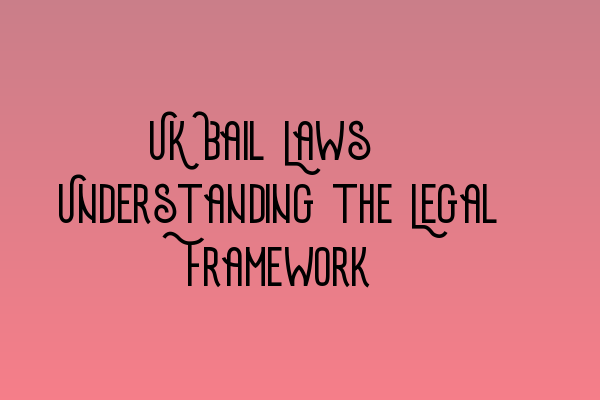UK Bail Laws: Understanding the Legal Framework
At SQE Criminal Law & Practice Law UK, we understand the importance of staying informed about the legal framework surrounding bail laws in the UK. Bail plays a crucial role in the criminal justice system, and it’s essential to have a comprehensive understanding of the laws and regulations that govern it.
What is Bail?
Bail refers to the release of a person from custody while they are awaiting trial or other legal proceedings. It is granted with the condition that the individual will return to court at the specified date and time. Failure to comply with the conditions of bail can lead to arrest and further consequences.
The Legal Framework for Bail in the UK
In the UK, the legal framework for bail is primarily governed by the Bail Act 1976. This legislation establishes the criteria and considerations for granting bail, as well as the factors that may lead to its refusal. The decision to grant or refuse bail is made by the court, taking into account the circumstances of the case and the likelihood of the defendant appearing in court for trial.
One important aspect of UK bail laws is the presumption of innocence. According to this principle, individuals charged with an offense are considered innocent until proven guilty. Bail allows the accused to maintain their freedom until proven guilty, reducing the potential negative impact on their personal and professional life.
Factors that courts consider when deciding whether or not to grant bail include the seriousness of the offense, previous criminal record, the risk of reoffending, the risk of interference with witnesses, and the likelihood of the accused absconding. These considerations ensure that bail decisions are made in the best interests of justice.
Types of Bail in the UK
There are several types of bail available in the UK:
- Police Bail: When a person is arrested, the police can release them on bail pending further investigation or inquiries. This allows the individual to be freed from custody without the need for a court hearing.
- Court Bail: Court bail is granted by the court during legal proceedings. It can be granted at any stage of the criminal justice process, including pre-trial, trial, and post-trial stages.
- Conditional Bail: Conditional bail requires the individual to comply with certain conditions, such as residing at a particular address, surrendering their passport, or reporting to a police station regularly. Failure to meet the conditions can result in the revocation of bail and re-arrest.
- Unconditional Bail: Unconditional bail does not impose any additional conditions on the individual’s release. However, the person is still required to attend court as scheduled.
The Role of Legal Professionals in Bail Proceedings
Legal professionals, such as solicitors and barristers, play a crucial role in bail proceedings. They provide legal advice and representation to individuals seeking bail and advocate for their clients’ interests in court. Solicitors familiar with the intricacies of bail laws can present strong arguments for the granting of bail based on relevant legal precedents.
If you or someone you know is facing legal proceedings involving bail, it is essential to seek the assistance of a qualified legal professional with expertise in criminal law. At SQE Criminal Law & Practice Law UK, we offer comprehensive legal services and can provide the guidance and support you need during this challenging time.
Conclusion
Understanding the legal framework surrounding bail laws in the UK is crucial for anyone involved in criminal proceedings. By familiarizing yourself with the Bail Act 1976 and seeking the guidance of a qualified legal professional, you can navigate the complex bail process effectively and protect your rights.
For more information on related topics, we recommend checking out the following articles:
